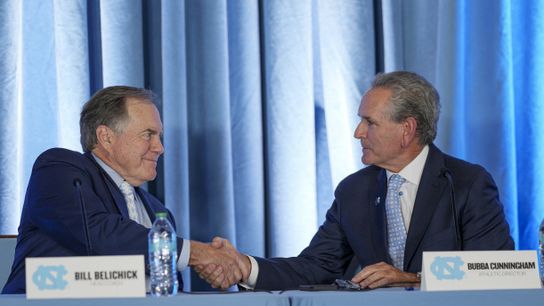Before he was attempting to broker a piece deal between Ukraine and Russia as the US Secretary of State, Marco Rubio was brokering a deal nearly as impactful on the future of the world: Bill Belichick to North Carolina.
That's according to ESPN, who on Friday published a long look at the internal politics that brought the 6-time Super Bowl winning head coach to Chapel Hill.
The story begins with Rubio, then merely a US Senator from Florida, reached out to his Republican colleague Thom Tillis.
"Rubio follows the sports world pretty closely, and he called me and said, 'There's a chance Belichick would come to Chapel Hill,'" Tillis told ESPN. "He said, 'He wants a school with a great academic reputation, and he wants to try to build a program to bring them a national championship. I said, 'Well, let me go [make some calls].'"
Tillis hung up the phone and immediately called Phil Berger, the North Carolina Senate president pro tempore, who had strong connections with power players at UNC. Berger initially laughed at the suggestion until Tillis assured him that, yes, Belichick truly wanted the job.
That became the spark that lit the fuse, and before long, the Belichick chase was a raging inferno among key stakeholders, including Preyer. As one source put it, "the push to land Belichick all started with the politicians."
Pryer is UNC board chair John Preyer, who led a search that pit the school's board against its own athletics department and AD Bubba Cunningham for control over the Tar Heels football program.
The power struggle began in Septmeber, when UNC lost 70-50 after James Madison, after which Mack Brown offered to resign if it would be in the best interest of the team. That didn't happen, but at that point Cunningham began preparing for Brown's departure and conducting a traditional coaching search -- listing names like Carolina alum and Steelers offensive coordinator Arthur Smith, Tulane head coach Jon Sumrall, and Iowa State head coach Matt Campbell, among others.
After Brown announced his intent to return in 2025 in late November, Cunningham fired Brown over the phone while in Hawaii with the Tar Heels men's basketball team -- a move Preyer called "shameful."
That began a civil war between Cunningham and administration, with North Carolina running concurrent searches for the same job. On Dec. 5, UNC administration presented an offer sheet to Belichick at a meeting in New York, all while Cunningham was interviewing his own set of candidates. From ESPN:
As the Belichick-to-North Carolina talk picked up steam, other candidates began to question North Carolina's commitment to an open coaching search. Campbell declined UNC's interview request, and Sumrall, after meeting with UNC leadership -- including Roberts and Cunningham -- in New Orleans on Dec. 7, withdrew his name from consideration. Sumrall ultimately signed an extension with Tulane on Dec. 9.
Dec. 9 was the same day Belichick sold himself for the job on Pat McAfee's show, effectively boxing Cunningham in to close a candidate he didn't want to hire in the first place. Again, from ESPN:
(UNC chancellor Lee) Roberts and Cunningham became aware of the unofficial offer on Dec. 6, and two days later, Roberts and UNC's legal team -- but notably, not Cunningham -- flew to Massachusetts to meet with Belichick in his office, open to finalizing a deal but aware they couldn't give him what Preyer had already offered. According to sources, there was a presumption this could mark an abrupt end to negotiations.
North Carolina announced Belichick as its next head coach on Dec. 11, paying him double Brown's $5 million salary in a deal that requires a massive financial commitment from UNC but allows the coach to walk for $1 million beginning June 1.
The process that led from Brown to Belichick did not end the power struggle between the University of North Carolina and its management. In January, UNC president Peter Hans wrote a memo to the board stating that, "(i)nstances continue to occur where members of the board appear to act independently of their campus's administration in matters squarely within the responsibility of the chancellor... create substantial legal risk to the University."
The fallout from the Belichick search will hang over North Carolina for years to come. But it ended with the politicians' man in the head coaching chair.
